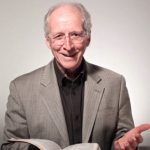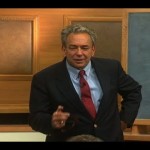 From the Rob writes in to ask: “Pastor John (Piper), as someone who is reformed/Calvinist, I highly appreciate Jonathan Edwards who claims that (1) free will is doing what we desire but that (2) God gives us the desire to do good. With that being said, and keeping James 1:13 in mind, I’m having trouble understanding where Lucifer received his first desire to sin. Norman Geisler says ‘the unmistakable logical conclusion for the extreme Calvinist [is that] both Lucifer and Adam sinned because God gave them the desire to sin’ [Chosen But Free, page 36]. I would imagine that Adam received his desire to sin from Eve who received it from the serpent/Satan, but if God is sovereign over all things — including our desires — would that make him the initial author of the first desire to sin?” How do you answer this mystery?
From the Rob writes in to ask: “Pastor John (Piper), as someone who is reformed/Calvinist, I highly appreciate Jonathan Edwards who claims that (1) free will is doing what we desire but that (2) God gives us the desire to do good. With that being said, and keeping James 1:13 in mind, I’m having trouble understanding where Lucifer received his first desire to sin. Norman Geisler says ‘the unmistakable logical conclusion for the extreme Calvinist [is that] both Lucifer and Adam sinned because God gave them the desire to sin’ [Chosen But Free, page 36]. I would imagine that Adam received his desire to sin from Eve who received it from the serpent/Satan, but if God is sovereign over all things — including our desires — would that make him the initial author of the first desire to sin?” How do you answer this mystery?
For as many years as I can remember, I have said that among the mysteries in my theology for which I do not have an adequate answer, one of them is the question how — “how” is a key word here — how did the first sin come about?
And by the first sin, I don’t mean Adam’s first sin, I mean Satan’s first sin, the very first sin in the universe. The Bible opens not with the beginning of evil, but with the presence of unexplained evil. Man is created innocent and the serpent is already there, deceitful, manifestly opposed to the God of creation, and that is where the Bible begins. And as far as I can see, no explanation is offered in the Bible for how Satan became evil. I know there are hints that he was a perfect angel created by God.
Jude refers to angels who did not stay within their own position of authority, but left their proper dwelling, whom God has kept in eternal chains under gloomy darkness until the judgment of the great day (Jude 6). And I don’t doubt that Satan was created good and fell from his proper place like Jude says, because I don’t think that evil and God are both eternal and ultimate realities. I am not a dualist. God and his goodness and wisdom and power are the only ultimate eternal realities. And evil is somehow derivative, secondary without God being a sinner. And all of that virtually all Christians agree on.
How did Satan become evil? I do not know. And it is plain to me that those who believe in ultimate self-determination of God’s creatures, like angels and humans, don’t know either. To say that Satan had free will — that is ultimate self determination — to say that Satan had free will is not an explanation for why he committed his first sin. It is a label. It is not an explanation. It is a label of a mystery. How could a perfectly good being with a perfectly good will and a perfectly good heart ever experience any imperfect impulse that would cause the will to move in the direction of sin? And the answer is, nobody knows, including those who say: Oh, it is free will. That is not an explanation. It is a name for a mystery.
 So we don’t know. The Bible doesn’t explain the how of it. So Rob quotes Norman Geisler who says, “The unmistakable, logical conclusion for the extreme Calvinist for both Lucifer and Adam that they sinned is because God gave them the desire to sin.” Now I am not sure whether I qualify for Geisler’s extreme Calvinist, but I strongly suspect that I do. But just at this point I am disagreeing with that description of me and I am saying: No, I am not driven to say God gave Lucifer his first desire to sin. That is an oversimplification of virtually everybody’s viewpoint. I do not know how Lucifer came to feel his first inclination to rebel against God.
So we don’t know. The Bible doesn’t explain the how of it. So Rob quotes Norman Geisler who says, “The unmistakable, logical conclusion for the extreme Calvinist for both Lucifer and Adam that they sinned is because God gave them the desire to sin.” Now I am not sure whether I qualify for Geisler’s extreme Calvinist, but I strongly suspect that I do. But just at this point I am disagreeing with that description of me and I am saying: No, I am not driven to say God gave Lucifer his first desire to sin. That is an oversimplification of virtually everybody’s viewpoint. I do not know how Lucifer came to feel his first inclination to rebel against God.
But here is what I do know. God is sovereign. Nothing comes to pass apart from his plan, which includes things he more or less causes directly, and things he more or less permits indirectly, and there is no doubt in my mind that Satan’s fall and all of the redemptive plan of God for the glory of his grace afterwards was according to God’s eternal plan. But it is precisely at this point that the how of the causality of Satan’s first sin worked we do not know.
I have a category in my thinking, in other words, for the fact that God can see to it that something come to pass which he hates. This is what he did, for example, when he planned the crucifixion of Jesus according to Acts 4:27–28. The murder of Jesus was sinful and it was planned down to the detail by God. You can read it in the Psalms and you can read it in the New Testament. Precisely how God does that, maintaining his sinlessness and the sin of the things that comes about and the moral accountability of those who do those sins, the how of that, I do not know. But I think the Bible leads us to believe that he is sovereign over all sin and that he never sins. That is what I believe the Bible teaches. Continue reading →
 The Deity of Christ – R.C. Sproul
The Deity of Christ – R.C. Sproul

